The Mitsuba Group endorses and supports international norms such as the United Nations' “International Bill of Human Rights,” the “Guiding Principles on Business and Human Rights” adopted and promoted by the UN, the “Ten Principles of the Global Compact,” the OECD “Guidelines for Multinational Enterprises on Responsible Business Conduct,” the ILO “Declaration on Fundamental Principles and Rights at Work,” and the “Tripartite Declaration of Principles concerning Multinational Enterprises and Social Policy” as guiding principles for its human rights policy.
Furthermore, while complying with relevant international law and the laws and regulations of each country, we embrace diversity and respect internationally defined human rights based on the Mission Statement of “providing pleasure and peace of mind to the people of the world.”
MITSUBA Group respects the rights of workers and strives to resolve various work-related issues through dialogues between labor and management.
MITSUBA Group does not tolerate any discrimination based on birth, nationality, creed, religion, gender, race, ethnicity, age, mental/physical disability, medical history, hobbies, educational background, social status, etc. Moreover, we will not engage in inhumane treatment such as harassment.
MITSUBA Group employs people in compliance with the laws and regulations of each country and region and does not allow child labor or forced labor.
MITSUBA Group complies with labor standards such as working hours and wages and strives to comply with the laws and regulations of each country and region. Moreover, we aim to create an efficient work environment and support the realization of work-life balance.
MITSUBA Group strives to create safe and healthy workplaces so that all people can work with peace of mind.
MITSUBA Group has been actively promoting the recruitment and diverse human resources, including women, foreigners, and people with disabilities, and improving the environment. In the future, in addition to the initiatives we have taken so far, we will promote further career support and work style reforms and implement personnel measures to utilize employee diversity in our business activities and reform our corporate culture.
MITSUBA Group believes that it is important to create a workplace where employees can work energetically for a long time so that each employee can lead a rich and fulfilling life. To this end, we will not only maintain and improve physical and mental health, but also promote the creation of a workplace environment and system that provide peace of mind in the event of life events (injury or illness).
MITSUBA Group strives to maximize the overlap between individual values and corporate values by instilling the management policy of “MITSUBA will bring out the best in its associates, as its associates bring out the best in MITSUBA.” Regarding the direction the company is aiming for, we will create a system and environment where employees understand and accept each other.
One aspect of our Management Policy is “MITSUBA will bring out the best in its associates, as its associates bring out the best in MITSUBA.” This concept expresses how an organization is composed of people and how organization growth is only possible through personal growth.
Through their work, individuals can grow by challenging high goals while researching and asking others what they do not understand.
In the MITSUBA Group’s human resource development, the Human Resources Department plays a central role in promoting employee development, centered on “education” consisting of OJT and Off-JT, and “personal development” in which employees develop skills through their own initiative.
At MITSUBA, we provide policies / sustainability education, rank-based education, specialized education, etc., based on the “Human Resources Requirements Definition” stipulated for each level and based on the outline diagram of the educational areas shown below.
| Off-JT training hours per employee Scope: MITSUBA employee |
FY 2023 : 18.1 hours |
|---|
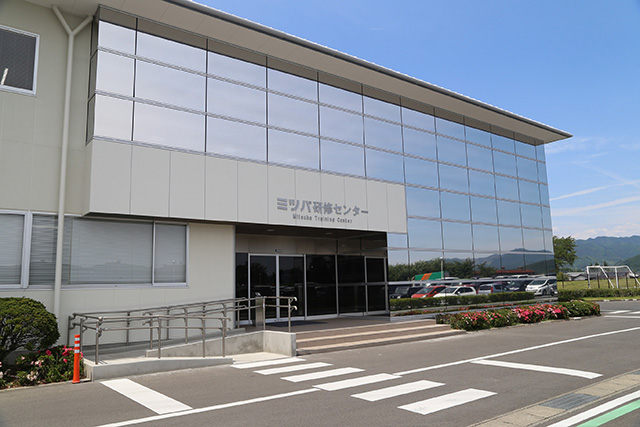
MITSUBA Group has established the “MITSUBA Training Center” as a place where diverse human resources with different values gather together from within MITSUBA Group, create awareness and foster new ways of thinking, and work hard for mutual self-improvement. We will respond to the diverse needs of customers around the world by facilitating exchanges among human resources with various knowledge and experience, and by creating new value.
Passing down technologies and skills, learned through long years of experience, is not easy. Therefore, MITSUBA Group considers it as an important job.
MITSUBA has an "In-house Training System" that provides job rotation, with the aim of supplementing the individual's abilities by gaining early experience in related organizations and operations, and utilizing them in future operations. In principle, employees in their 4th to 6th years with the company receive work experience in other departments for one year. Moreover, the target persons are all regular employees.
MITSUBA has established an "In-house Study Abroad System" with the aim of systematically implementing personnel exchanges across functions and businesses, broadening horizons by experiencing different types of operations, and developing human resources that meet the human resources requirements. The program is aimed at regular employees, and as a general rule, these employees spend 6 months to 3 years working on a theme or mission at the study abroad destination. Furthermore, the participants are selected from organizations or through volunteering.
"Short-term assignment system" is established for the purpose of acquiring a broad perspective and ability to respond by experiencing and accomplishing missions in environments other than MITSUBA, such as domestic and overseas group companies. Targeting young and mid-level employees, the period of assignment is from one year to one and a half years.
MITSUBA implements the following initiatives to support career development.
| Contents | Implementation period | Main purpose |
|---|---|---|
| Career Design Sheet | Once a year | Implement evaluation of knowledge and skills to shape future career |
| Career Design Training | Five times a year | Self-awareness of one's own strengths and weaknesses and thinking about future career plan |
| Career interview (Age 50/55) | At age 50/55 | Improve employee independence and autonomy |
| 1 on 1 | Monthly (recommended) | Improve employee independence and autonomy and eliminate lack of communication |
MITSUBA utilizes the “Personnel Evaluation System” as a human resource development tool to broaden perspectives, develop the skills and techniques necessary for work, and share work-related tips and tricks through communication with supervisors. Every six months, employees create goals that describe their performance objectives and their expected results and processes and meet with their superiors at the beginning of each six months to clarify their roles and gain an understanding of organizational goals. At the end of the semester, employees self-evaluate their level of goal achievement and receive evaluation and feedback from their superiors in order to improve their future growth. MITSUBA has a systematized the feedback process and created an environment in which all eligible full-time employees can reliably implement it.
Moreover, in personnel evaluations, in addition to “performance evaluations” for the above goals, we also conduct “behavior evaluations” to evaluate the behavior expected of each employee based on the code of practice “MITSUBA WAY.” The results of such are designed to be reflected in the bonuses.
In order to create new value and pleasure which are the goals of “MITSUBA VISION 2030”, it is essential to accept diversity, respect ideas and values, and realize diversity that includes open exchanges regardless of position or organization. MITSUBA has been actively hiring and promoting diverse human resources such as foreigners, and people with disabilities, and actively improving our workplace environment. Moving forward, in addition to our initiatives thus far, we will promote further career support and work style reforms and implement personnel measures that utilize the diversity of our employees in our business activities and internal culture reforms.
In order to support employees who are raising children, MITSUBA has established a “shortened working hours system for childcare” that can be used until their child reaches the second grade of elementary school. In addition to annual paid leave, MITSUBA has also established a “life support leave system” that can be taken for situations such as caring for a family member or commuting to a hospital, infertility treatment, etc. Similar to childcare, for employees who are caring for a family member, we have established a “shortened working hours system”, “long-term care leave system”, and “long-term care absence system.” These systems support a balance between work and family.
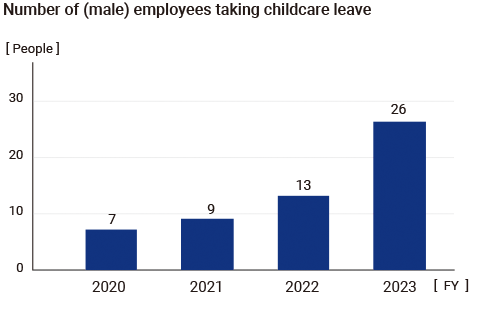
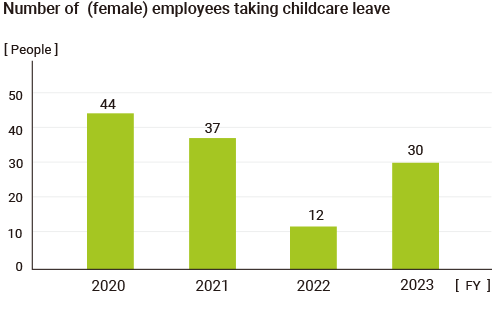
In April 2007, MITSUBA Group established “Ohisama Garden”, an in-house daycare center for Group employees, as part of initiatives to create an environment in which makes work easier for employees who are raising children. MITSUBA believes that an environment where children can be raised with care leads to a sense of security, which in turn leads to the peace of mind we provide to people around the world. Many female employees return to work after taking the maternity leave and childcare leave system. MITSUBA is promoting the social advancement of women throughout our company.
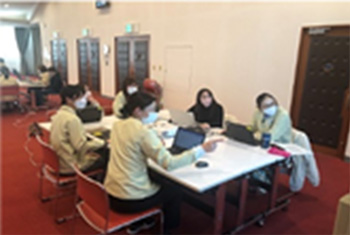
Regular meeting
MITSUBA launched the “Women's Empowerment Promotion Project” in September 2022 as a company-wide project directly managed by top management and has been working on it ever since. The members selected from each division within the company exchange opinions across division and job boundaries to consider and propose measures to create a workplace environment, corporate system, and communication environment that is easy for women to work in and make recommendations and proposals to top management through the human resources meetings and other forums. The proposed measures are reflected in revisions to systems and rules, contributing to the improvement of systems and culture within MITSUBA. In April 2024, we started to revamp our objectives and project members and promote activities to achieve “Career Advancement and Skill Development for Women.”
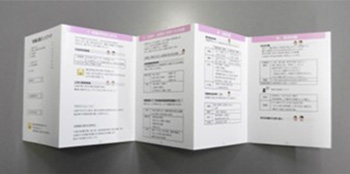
Pregnancy and Childbirth Handbook
(Distributed to all MITSUBA employees)
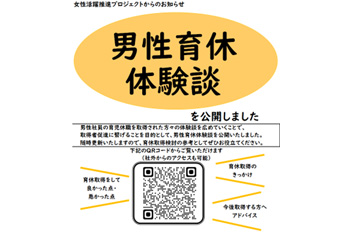
Publication of Paternity
Leave Experiences
MITSUBA Group is expanding our business globally, so for the purpose of sharing values and encouraging the standardization of management skills, MITSUBA expands opportunities for non-Japanese human resources to interact in various situations such as “Global Leader Development Training” and human resource development through practical training in Japan. Furthermore, since last year, we have been using the intra-company transfer system to accept human resources from affiliated overseas Group companies and develop human resources through practical work functions at the Head Office. We will continue to actively utilize and promote overseas human resources.
MITSUBA has established a special subsidiary, AMCO Corporation, and has been promoting the employment of persons with disabilities. As working styles become increasingly diversified, we have established the MITSUBA Group Disabled Persons Employment Committee, and will not only proactively recruit persons with disabilities, but also work to create a comfortable working environment for them.
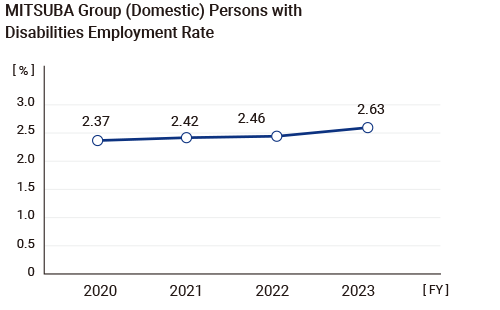
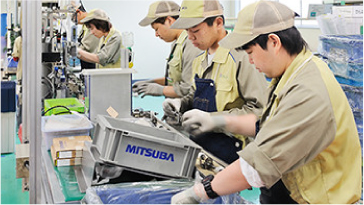
AMCO
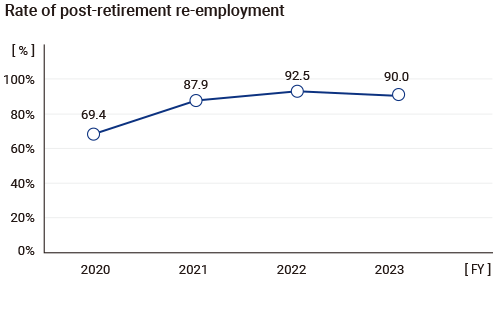
At MITSUBA, the retirement age is at 60 years old. However, we have a “post-retirement re-employment system” that allows employees to continue working if they wish to do so. Every year, by utilizing skills and knowledge cultivated over many years, many employees continue to fill active roles in various workplaces even after their retirement.
- We will make MITSUBA the brand of choice on a global scale -
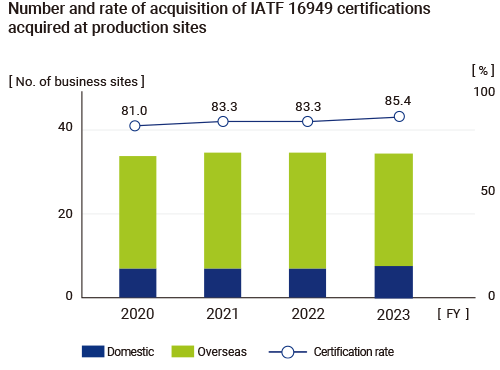
MITSUBA has built and operates a quality management system that complies with the international standard IATF 16949 for the automobile industry. We are working to continuously provide products that meet the needs of our customers and comply with laws and regulations in each country.
We have acquired and maintained IATF 16949 certification at our production sites, including overseas and domestic group sites, and we are promoting continuous improvement of our quality management system.
As part of our internal quality control, we conduct yearly “internal quality audits” at each business location to check whether processes are functioning properly, and use management reviews to improve our systems. Furthermore, in order to strengthen control across the entire Group, MITSUBA Head Office audits the quality assurance systems of both overseas and domestic group companies and works to standardize the operation of MITSUBA’s quality management system. Moreover, we conduct quality compliance audits to check whether on-site inspections are being carried out properly in accordance with the rules, and whether any irregularities such as data tampering have occurred, by checking the actual site and the actual items.
MITSUBA evaluates the appropriateness, adequacy, and effectiveness of its quality management system, monitors progress on quality concerns, and offers improvement instructions at quality meetings led by the President and Representative Director. Moreover, we have formed quality committees for each function, such as production technology and production departments, to design systematic quality improvement strategies with the aim of increasing quality levels and optimizing global quality costs.
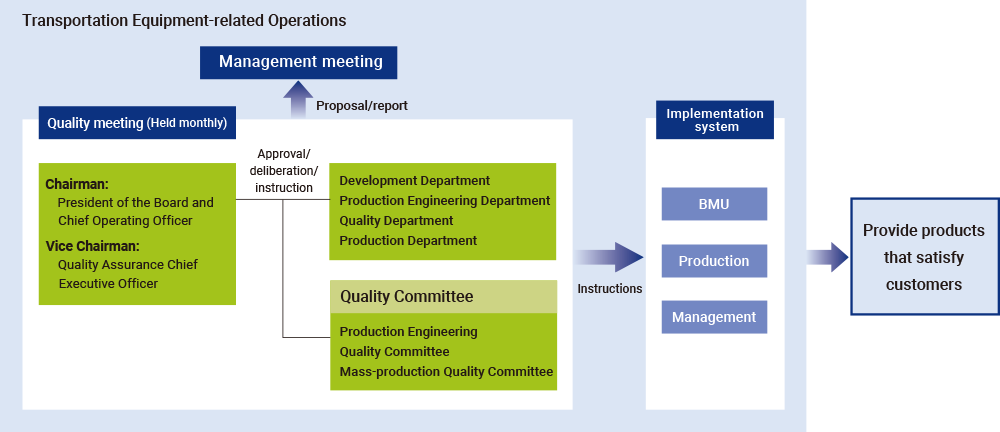
Based on our product development flow, MITSUBA holds quality verification meetings at each stage from development planning to design and production. At these meetings, we evaluate product safety and conformity with quality regulations.
In quality assurance activities prior to mass production, we hold production trials (full takt trials) equivalent to mass production in order to evaluate fluctuations in quality and to prevent the recurrence of the quality issues.
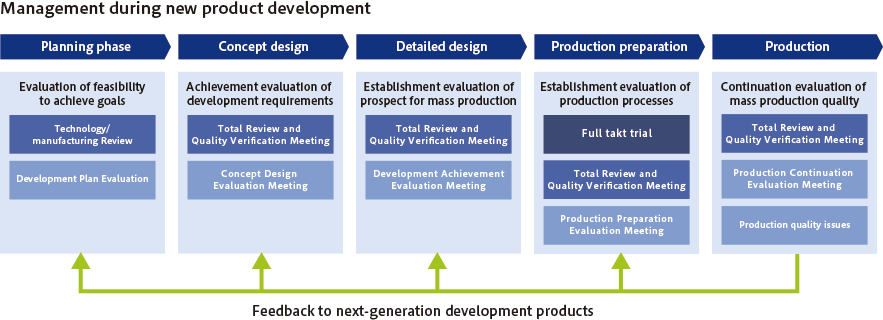
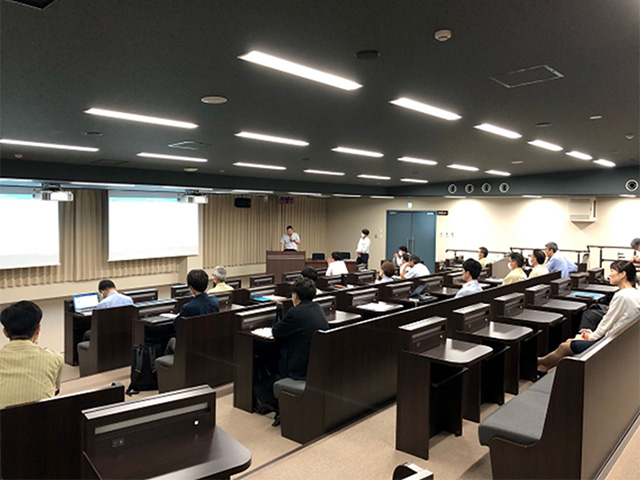
Quality Culture Training
MITSUBA's quality education systematically develops human resources through stratified education and specialized education.
For stratified education, we have started education for managers that fosters a culture of quality. We are also working to build management that places utmost priority on quality. We also strive to improve quality awareness by learning lessons from problems in the past and providing feedback to product development to ensure the safety of new products.
For specialized education, in order to establish highly durable designs (including changes in the operating environment and changes overtime) and processes which make manufacturing easier, we are conducting quality engineering education and working on concurrent development (*) that combines simulation and quality engineering.
(*) Concurrent development: A method that shortens the development process by simultaneously promoting upstream processes such as planning and design and downstream processes such as manufacturing and testing, and by optimizing designs and processes at the initial stage of development. Since related departments gather and communicate among them, mutual losses due to miscommunication can be avoided.
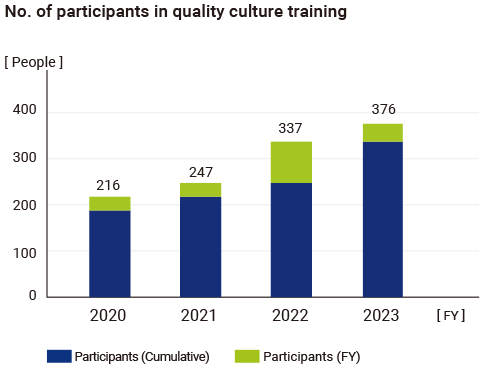
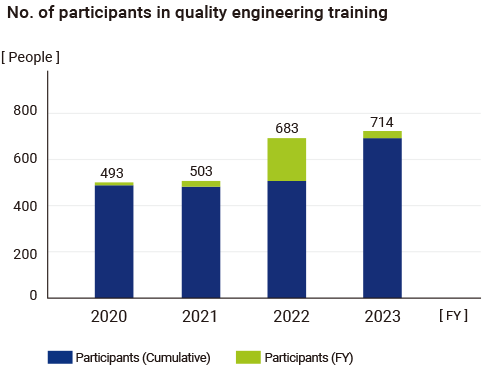
In order for MITSUBA to continue to be chosen by customers, the cooperation of our suppliers who provide us with the components and materials for our products is essential. MITSUBA issues quality control standards based on the international standard IATF 16949 for the automotive industry to all of its suppliers, and requires them to comply with these standards. Furthermore, we are working closely with our suppliers to establish quality assurance system, and provide ongoing support in order to enhance the quality assurance systems of our suppliers.
At MITSUBA, we are engaged in “MEE activities” based on QC circle activities. MEE activities have a history of more than 55 years since their introduction, with the aim of improving skills and self-actualization through group activities, creating a bright, energetic and fulfilling workplace, and improving customer satisfaction. These activities are being expanded widely, including domestic and overseas MITSUBA Group companies. Improvement cases are selected from the companies and reported at MEE Conference regularly. We will continue our quality improvement activities in the future to further improve quality.
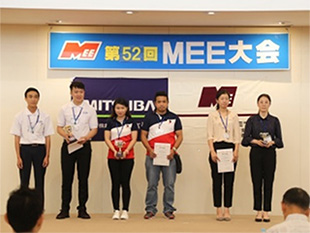
MEE Conference (Japan)
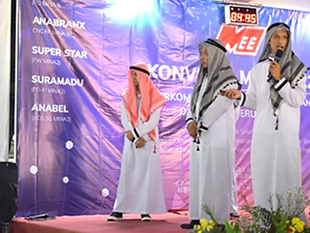
MEE Conference (Indonesia)
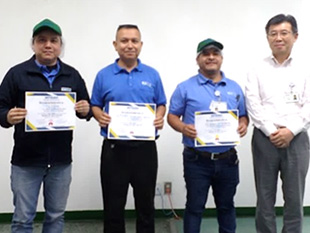
MEE Conference (Mexico)
Safety measures are an essential theme in the manufacturing industry. MITSUBA group thoroughly implements the principle of “safety first” and works to cultivate “culture of safety” remembering that “ensuring safety is the responsibility of the company and compliance with rules is the responsibility of employees”, and strives to create a system that autonomously promotes occupational safety and health measures through labor-management cooperation. We aim to create a safe, healthy, and comfortable working environment by ensuring that each employee considers occupational accidents and mental health as their own concerns, as well as by providing a “safe working environment” and “psychological safety.”
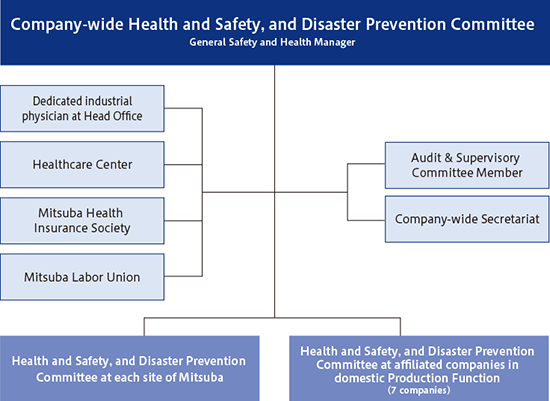
In order to strengthen information sharing between business sites and the implementation of measures, MITSUBA Group has established a “Company-wide Safety, Health, and Disaster Prevention Committee,” chaired by the Executive Officer in charge of production. Furthermore, we have established a “Health and Safety, and Disaster Prevention Committee” at each business site and hold monthly meetings to ensure and improve the occupational health and safety of the employees by taking into account employee opinions and requests.
(*) An index that expresses the frequency of accidents is the number of fatalities and injuries due to occupational accidents, including injuries and illnesses resulting in absence from work, per 1 million actual working hours.
Total accident frequency rate = Number of fatalities and injuries due to occupational accidents including injuries and illnesses resulting in absence from work/Total actual working hours x 1,000,000
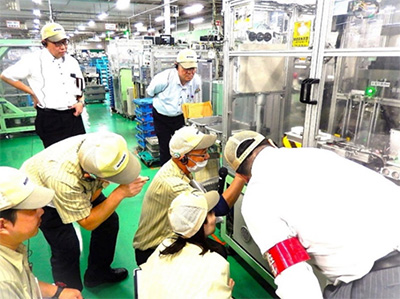
Patrol
MITSUBA Group conducts workplace safety patrols and mutual safety patrols between workplaces. Improvement activities based on patrol results lead to the reduction of unsafe acts and the strengthening of safety measures. We carry out risk assessments on newly introduced and all existing equipment, including those that undergo operation change, implementing countermeasures prioritizing areas with a high-risk level, reflecting this in work instruction sheets, and providing operator education to prevent occupational accidents from occurring. Moreover, we are striving to improve our management system by referring to examples of workplaces that have been accident-free for a long period of time.
MITSUBA Group has prepared work instruction sheets that clearly describes the key points of work, protective equipment to be worn, and methods for handling chemical substances, so that anyone can work safely and produce products that meet quality standards. Moreover, at business sites that operate a foreign technical internship program, we translate work instruction sheets and other notices into the native languages of the trainees (Chinese and Vietnamese) to ensure that they can work and act safely at their work sites.
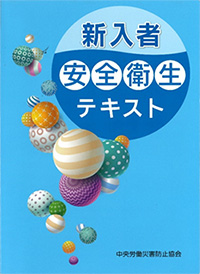
At MITSUBA, as an educational curriculum that matches the employee’s rank and role, newly promoted employees increase their knowledge of health and safety through stratified education. Moreover, we apply practical techniques such as KYT (Risk prediction training), and TWI-JS (Safe work methods) for managers and supervisors to acquire skills to lead the workplace.
Furthermore, when dispatched employees are hired, we provide trainings for new hires, as well as educational curriculums and support at the request of partner companies.
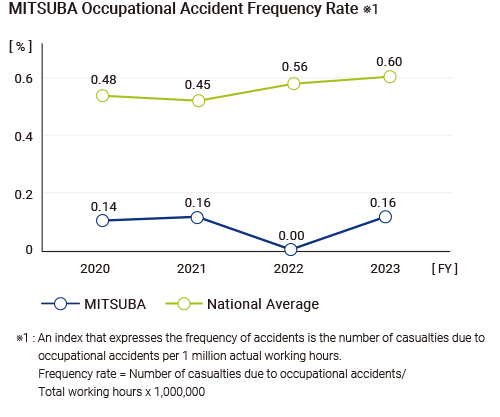
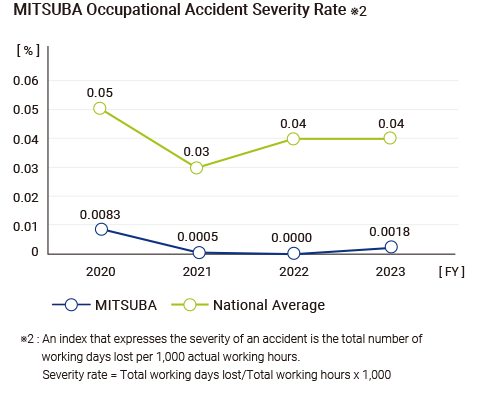
When occupational accidents occur, the company-wide corporate general safety and health manager of MITSUBA Group personally visits the site to inspect the situation and pinpoint the underlying cause. We also use an Occupational Accident Analysis Sheet to identify the cause, take measures to prevent recurrence, and verify the effectiveness of the measures. Regarding occupational accidents, the Company-wide Safety, Health, and Disaster Prevention Committee is working to prevent similar accidents from occurring by laterally spreading information to each business site.
MITSUBA believes that the mental and physical health of its employees is a valuable asset essential for business continuity. For this reason, we not only analyze the results of statutory health checkups and stress checks, but also hold voluntary seminars in cooperation with the health insurance association to help employees exercise, maintain and promote mental health, and prevent various diseases.
MITSUBA Group upholds respect for human rights in its code of practice, “How We Should Act.” Moreover, to continue to be a company that is trusted by the international community, we communicate not only with our employees, but also with our suppliers and local communities; and respect the basic human rights of society as a whole.
MITSUBA Group advocates the abolition of discrimination in its code of practice “How We Should Act” and works to create a comfortable workplace where diverse human personnel can thrive and play an active role, regardless of their birth, nationality, creed, religion, gender, race, ethnicity, age, mental/physical disability, medical history, social status, etc. Moreover, when hiring, applicants are judged on matters unrelated to the applicant's aptitude or ability, such as “matters beyond the applicant’s responsibility” as in family or living environment, and “matters of essential liberty” as in religion or ideology. In addition, briefing sessions for interviewers are conducted to ensure that they have a good understanding of our hiring process, as well as to ensure fairness.
MITSUBA prohibits harassment related to gender, pregnancy, childbirth, childcare, elderly care, as well as power harassment and sexual harassment, etc. and establishes internal regulations to these effects. Moreover, we have established “MITSUBA Comprehensive Consultation Desk” both inside and outside the company, and when a matter is reported, we verify the facts and take measures to prevent recurrence.
In order to prevent child labor, MITSUBA confirms the age in the documents submitted when joining the company. In addition to hiring people who apply of their own free will, we also strive to prevent forced labor by providing prior notice (in writing) of working conditions to hired employees, and not requiring foreign technical intern trainees to keep important employee documents such as passports in the company’s custody.
MITSUBA considers collective bargaining to be an element of basic human rights that should be respected as a company, and recognizes the right of employees to bargain collectively regarding wages, working conditions, etc., in collective bargaining agreements.
MITSUBA has adopted a union shop system, and all non-managerial regular employees, with the exception of some management-related employees, are members of the labor union. With the aim of establishing fair and stable labor-management relations, we have concluded a comprehensive collective labor agreement, available to all employees at any time via the intranet, promoting MITSUBA’s development and improving the lives of union members.
At MITSUBA, we hold a central management meeting for the entire company and a departmental management meeting for each department every month. In addition, the labor union and the human resources department hold labor relations committee meetings weekly to create a better workplace environment, where active exchange of opinions and information between labor and management takes place on a daily basis. Moreover, when revising or establishing new systems that have a significant impact on employees’ work styles and working conditions, these new systems are implemented only after mutual consultation and agreement between labor and management.
Furthermore, in order to promote communication between the company and its employees, we are actively implementing “Kurumaza,” which is a dialogue and information exchange between management and employees in each department. This serves as an opportunity to convey management policies and ideas to employees and to directly confirm the opinions of employees to such policies and ideas.
MITSUBA is working to raise awareness of human rights by conducting CSR education (including content on harassment) for employees using e-learning and by providing education on harassment at the “Personnel Labor Meeting” for managers once a year.
MITSUBA Group has set up the “MITSUBA Comprehensive Consultation Desk”, both internally and externally (at law firms), where employees can report and consult about “corporate ethics” and “compliance,” including discrimination and harassment. When operating the MITSUBA Comprehensive Consultation Desk, we ensure that the service can be used with peace of mind by protecting the privacy of whistleblowers and consulters and preventing any disadvantage.
In MITSUBA, a check sheet is used to periodically (once a year) evaluate the effectiveness of sustainability activities, including human rights. Furthermore, each Group company regularly (yearly) conducts a self-evaluation using a checklist based on the Group's sustainability standards. The questions on human rights in the checklist are based on human rights items that should be considered in the corporate activities of MITSUBA Group, such as prevention of child labor by verifying age at the time of employment, and all types of harassment and discrimination in human resources. We analyze human rights issues within the MITSUBA Group based on the results of each Group company’s self-evaluation and use this information to develop measures to correct and improve these issues.
MITSUBA Group values our founding spirit of “contributing to the local community .” Our group companies throughout the world engage in various social contribution activities.